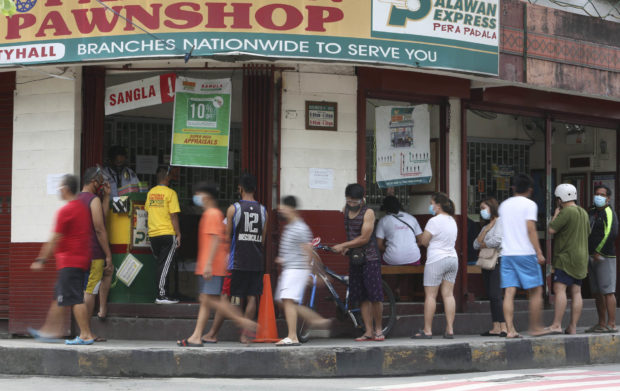Pandemic forcing desperate trips to pawnshops

LIFELINE The neighborhood “sanglaan’’ has become the go-to solution, if not the last resort, for many Filipino breadwinners left jobless by the coronavirus pandemic and the ensuing economic slump. —MARIANNE BERMUDEZ
MANILA, Philippines — Gym receptionist Jen Caindoy did not think twice about pawning four pieces of jewelry right after Malacañang announced the start of the enhanced community quarantine (ECQ) on March 16.
“I was in a state of panic,” said Caindoy, 33, of San Isidro, Parañaque City. She said she was afraid all stores would be closed and her savings would not be enough to sustain her and her family.
The family consists of her father and elder brother who are cockfighting aficionados with no regular source of income, her brother’s three children, her sister, and herself.
She was the only one with a stable income, earning P12,000 a month until the gym, considered a nonessential establishment under the ECQ, was closed. She now earns P450 a day working part time at a milk tea shop.
Caindoy went to the pawnshop in Barangay BF Homes before the ECQ began and was able to get more than P23,000 for a white gold necklace, a yellow gold ring, and two yellow gold bracelets.
Article continues after this advertisementSpeaking to the Inquirer by phone, Caindoy said she had a friend who advised her years ago that it would be good to invest in gold jewelry.
Article continues after this advertisement“My friend was correct,” she said. “I experienced pawning my jewelry for the first time when we needed to repair the third floor of our house. And I was able to pay back that loan quickly.”
Steep rise in gold prices
One pawnshop worker who requested anonymity said the steep rise in gold prices in the world market had also raised the cash offered for pawned gold jewelry.
A gram of 18-karat gold can now be pawned for P2,100, up from the old rate of P1,800. Fourteen-karat jewelry with less gold content allows an owner to borrow P1,600 per gram, from the usual P1,400.
The pawnshop in BF Homes charges Caindoy 3.5 percent in monthly interest based on the principal amount she borrowed. She was given four months, or until July, to pay back the principal loan and four months’ worth of interest.
It’s common practice for a borrower who cannot pay the principal after four months to raise enough to pay the monthly interest so the pawned jewelry would not be auctioned off.
However, Caindoy’s part-time earnings are not even enough to pay for utilities.
“It’s regrettable — nakakapanghinayang — but I really do not know where to get the money to pay back my pawnshop loan,” she said.
Caindoy recalled setting aside a portion of her salary in her younger days so she could buy her own jewelry. She said she knew that buying gold was better than putting one’s savings in the bank.
“But I am now unable to pay even the interest, just to extend the deadline. I doubt if I’d see my jewelry again. I could try asking for consideration because of the ongoing quarantine,” she said, adding:
“It really makes life more difficult for everyone.”
Widow’s worries
Irene Maala Sevilla, a 47-year-old widow with four children, used to earn P800 daily selling plants at the BF Homes public market.
For years, she had been sending P500 every three days to her children in Talisay, Batangas province, until Taal Volcano erupted in January and she was forced to pawn her P12,000 gold necklace for P5,700.
She was still making enough to send money to her kids “despite threats to cut off our electricity because of nonpayment,” she said in a phone interview.
Sevilla had saved enough to redeem the necklace before the due date set by the pawnshop. Then the ECQ was imposed, and her eldest child, aged 22, lost his job.
She sent the money she had saved to her children instead.
Aside from the regular remittances to Batangas, Sevilla worries about her expenses in the city. The boarding house where she stays in BF Homes charges P2,000 monthly. She also pays P4,000 a month for the space in the public market where she sells household plants.
“I used to earn P800 a day, but now I’m lucky if I earn P300,” the widow said. “And there are days when I sell nothing because plants are not as necessary as food.”
Sevilla said she had observed how gold jewelry was helping tide people over in a financial crisis.
Gold jewelry can be depended on during emergencies, “more than some relatives,” she said. “And believe me, it hurts when some people say ‘no’ even when they can see how hard up I am.”
Confidence
Still, Sevilla is confident of saving enough to pay the monthly interest required by the pawnshop.
Like Caindoy, she was supposed to pay both principal loan and interest for four months by July. But her regular monthly payments assured the pawnshop that she would eventually raise enough cash to pay everything back.
Sevilla said she was determined to pay the pawnshop and redeem her necklace.
“And then I’ll leave for Batangas,” she said. “I just don’t want to be known here in the market as the woman who could not pay her loan back.”
For more news about the novel coronavirus click here.
What you need to know about Coronavirus.
For more information on COVID-19, call the DOH Hotline: (02) 86517800 local 1149/1150.
The Inquirer Foundation supports our healthcare frontliners and is still accepting cash donations to be deposited at Banco de Oro (BDO) current account #007960018860 or donate through PayMaya using this link.